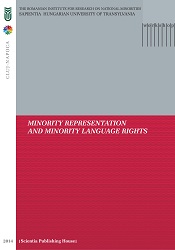The Alevi-Bektaşi Religious Group of Turkey. Its History and Today
The Alevi-Bektaşi Religious Group of Turkey. Its History and Today
Author(s): Szilárd Szilágyi
Subject(s): Politics / Political Sciences, Theology and Religion
Published by: Scientia Kiadó
Summary/Abstract: The Alevi-Bektaşis of Turkey are a very interesting religious denomination in Turkey, which unites many influences from religions and religious denominations like Shia and Sunni Islam, Hurufism, Christianity, Zoroastrism, Shamanism and the Islam mysticism called Sufism. My presentation will point out their huge importance and influence in Europe in the expansion of the Islamic religion in the Middle Ages, with the founding of many Bektaşi ‘monasteries,’ called tekkes, in the Balkanic Peninsula, today’s Romania and Hungary; their importance in the history of the Turkish culture, their relations with the Ottoman power, from a privileged class, backed by the Janissaries, called also the military wing of the Bektaşis, which has been banned and closed from the beginning of the XIX. century, but it is still a flourishing and growing religious order in underground. After World War I, with the foundation of the Turkish Republic, came the prohibition of all the religious and mystical Sufi orders, which brought the Bektaşi order to an end, but the Alevis, the so-called Village Bektaşi, which are more a heterodox religious denomination than a rel igious order – but as for their roots, religious beliefs, ceremonies, traditions and revered founding ‘saints,’ they are the same with Bektaşis –, today call themselves Alevi-Bektaşi, the continuers of the old Bektaşis. In my paper, I will demonstrate the extent to which the Alevis can be called Bektaşis and how their traditions survive today, in the modern world. I will also present the attitude of today’s pro-orthodox Islam political power towards a group which traditionally supports the secular left parties, in which they feel their religious values and freedom less threatened. I will also point out the relations of the Alevi-Bektaşis to the Sunni majority of the Turkish population and some of their tragic conflicts from the recent past
Book: MINORITY REPRESENTATION AND MINORITY LANGUAGE RIGHTS
- Page Range: 353-360
- Page Count: 8
- Publication Year: 2014
- Language: English
- Content File-PDF

